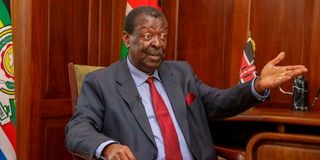Premium
Kenya to formally open embassy in Rabat

Prime Cabinet Secretary Musalia Mudavadi during an interview in his office in Nairobi on May 22, 2025.
What you need to know:
- Mr Mudavadi is also set to hold bilateral talks during a visit from Sunday, May 25, to Tuesday, May 27.
- According to his office, the visit aims to deepen diplomatic and economic ties between Kenya and Morocco.
Kenya will, on Monday, formally open its embassy in Rabat, Morocco, signaling official contacts in the northern African country after it deployed an ambassador over a year ago.
Kenya’s Prime Cabinet Secretary, Musalia Mudavadi, is in Rabat this weekend and one of the items on the agenda is to open the doors of the embassy that has been somewhat in operation since December 2023.
Mudavadi, also the Cabinet Secretary for Foreign and Diaspora Affairs, is also set to hold bilateral talks during a visit from Sunday, May 25, to Tuesday, May 27.
According to his office, the visit aims to deepen diplomatic and economic ties between Kenya and Morocco.
Kenya first deployed a resident ambassador to Morocco in December 2023 after sending Jessica Gakinya to Rabat. Before that Kenya ran relations from neighbouring Algeria although a consul-general operated from Rabat on a voluntary basis. Morocco, as well as Cote d’Ivoire were the stations
Kenya wanted to open missions to establish stronger ties in French speaking regions. Kenya hasn’t yet opened the Ivorian mission though and still uses the high commission in Ghana which itself has no head after two nominees refused to take the position, citing separate personal reasons.
It signals a turnaround in relations that were often lukewarm because Kenya tended to side with Algerian stance on the Western Sahara issue. A portion of the region is run as the Sahrawi Arab Democratic Republic (SADR) under the Polisario Front which is exiled in the Algerian refugee camps.
Although Kenya is one of the few countries on the Polisario Front's list of supporters (it hosts an SADR ambassador in Nairobi), Morocco has campaigned to isolate the region by tightening relations with countries across the continent.
Abderrazzak Laassel, the Moroccan ambassador to Kenya and South Sudan, last year said that “Kenya's appointment of the first female ambassador to Morocco indicates an increase in the level of diplomatic relations between Rabat and Nairobi.”
Morocco sees Western Sahara as its southern provinces and should be treated as a part of Morocco, even though the UN is supposed to address the determination question on its future.
It will be Mudavadi’s inaugural trip to Rabat as foreign minister.
Mudavadi is also scheduled to meet Moroccan Prime Minister Aziz Akhannouch for bilateral discussions.
Kenya established diplomatic ties with Morocco in 1965. In 1982, they soured after Nairobi hosted an Organisation of African Unity meeting that admitted SADR as a member of the continental bloc now known as African Union. Morocco quit OAU immediately but return to the AU in 2017.
“Several MOUs are proposed to be signed during the visit, including an MoU on Housing, an MoU between the Foreign Service Academy and the Diplomatic Academy in Morocco, among others.”
The visit comes just weeks after President William Ruto administration formally adopted Sessional Paper No. 1 of 2025 on Foreign Policy, a strategic document outlining the country’s foreign policy priorities.
While the paper reaffirms Nairobi’s commitment to the One-China Policy, it notably omits any mention of Western Sahara, despite earlier drafts calling for “support for the inalienable right of all peoples to self-determination, including the people of Western Sahara.”
The paragraph removed after recommendations by the Parliamentary Committee on Defence, Intelligence, and Foreign Relations, which cited “the evolving nature of geopolitics” as justification.
It may reflect Ruto’s cautious retreat from explicit support for the Sahrawi Arab Democratic Republic (SADR)—a long-standing position that saw Nairobi host SADR President Brahim Ghali.


